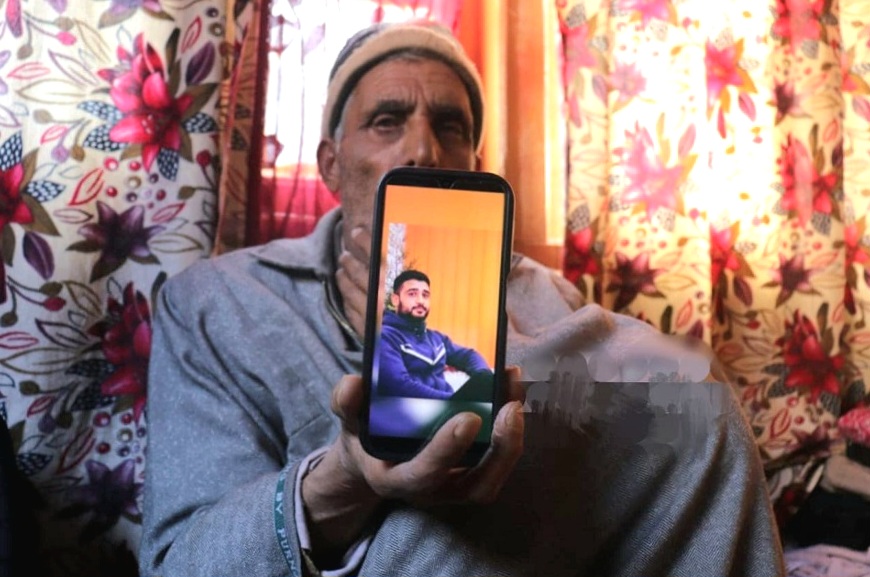Tauseef Ahmad, Sajid Raina/TwoCircles.net
Srinagar: For many young Indians, securing a job offer from a foreign country is a dream come true, offering the chance to escape unemployment and build a brighter future. However, with the rise of fraudulent job offers, the dreams of many turn into nightmares.
This is the unfortunate reality for Faizan, a 27-year-old from Safakadal, Kashmir, who is now trapped in Myanmar.
Hoping for a better future for himself and his family, he has become a victim of human traffickers in Myanmar, who are demanding Rs 4.5 lakh for his release.
“He left home on December 11 for Bangkok with his friend. We were all happy for him and this opportunity, but what seemed like a golden chance quickly turned into a terrifying ordeal,” Faizan’s father Ghulam Rasool Bhat told TwoCircles.net.

The father of Faizan’s friend, who was traveling with him, informed Ghulam Rasool that Faizan had been held hostage in Myanmar. The captors demanded Rs 4.5 lakh for his release — the same amount they had paid for the return of his friend.
The friend somehow managed to arrange the required amount and was allowed to return, but Faizan’s family is unable to afford such a large sum, as poverty had already pushed him to seek a job abroad.
Faizan’s mother Yasmeena Begum, clutching an old photograph of her son, broke down while narrating the ordeal, “I spoke to him last on February 21. He was pleading for help. His last words were, ‘Mother, please save me. I am in pain, please do something and get me back’,” she said.
“He left with dreams in his eyes. Now we do not even know if he is alive. Every night, I wake up thinking he might be calling for help, but we are powerless.”
Faizan’s father, a daily wage laborer, is equally devastated. “We are helpless. We have no way to arrange such a huge amount. If the government does not act, we may never see each other again,” he said. “I have knocked on every door, but nothing has happened yet.”
Inyatullah Khan, a social activist, told TwoCircles.net hat unemployment in Kashmir forces youth to seek opportunities abroad. “Many find good jobs, but many fall into the trap of fraudulent job offers,” he said. “Thousands of youths with master’s and doctoral degrees in the Valley are unemployed, working for meagre salaries.”

Apart from Faizan’s family, MLA Eidgah Mubarak Gul has also urged Chief Minister Omar Abdullah to intervene and help secure the young man’s release.
Meanwhile, the Jammu and Kashmir Students Association (JKSA) has written to Union External Minister S. Jaishankar, raising the issue and seeking his intervention. In its appeal, the association has urged the minister to engage diplomatically with Myanmar to ensure Faizan’s release.
Growing crisis of human trafficking
Faizan’s case is not an isolated incident of fraudulent job offers. Many youth have been duped by fraudsters in recent years. Last year, a Kashmiri man was caught up in the Russia-Ukraine war, only to be rescued months later after the Ministry of External Affairs (MEA) intervened.
Faizan’s friend, who was trapped with him, was returned home after his family somehow managed to arrange the money. However, their relief came at a devastating cost. The family borrowed money from relatives to bring their son back — something Ghulam Rasool was unable to do.
Reports indicate that more than 7,000 foreign nationals have been rescued by Chinese, Thai and Myanmar authorities after a Chinese actor was held hostage after being promised a job.
According to data from the United Nations Office on Drugs and Crime, cyber scams in South Asia alone have resulted in losses ranging from $18 billion to $37 billion.
In Myanmar, authorities have rescued 540 Indian nationals who were duped by a cyber fraud racket. These individuals were promised lucrative job offers, only to be forced into committing cybercrimes.
The MEA has confirmed that 283 of these individuals have already been flown back to India on Indian Air Force (IAF) aircraft from Mae Sot, Thailand. The remaining 257 are expected to return today, March 11, in a second flight.
The MEA also stated that these individuals were deceived by promises of high-paying jobs but were instead coerced into participating in cyber fraud operations, primarily in areas near the Myanmar-Thailand border.


